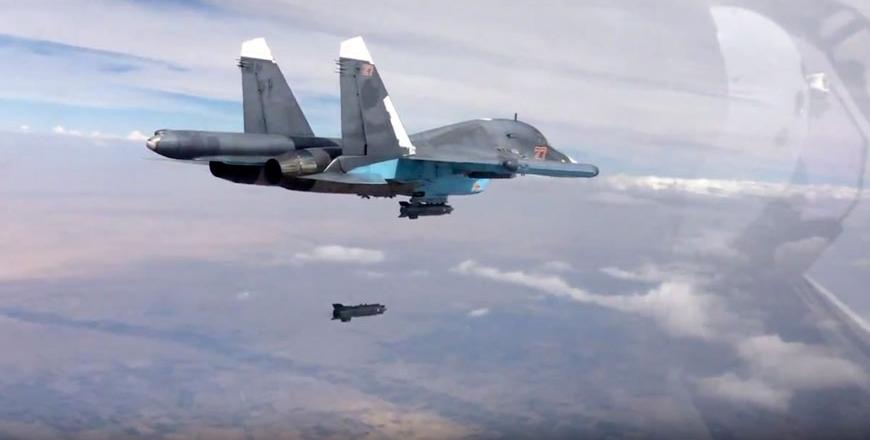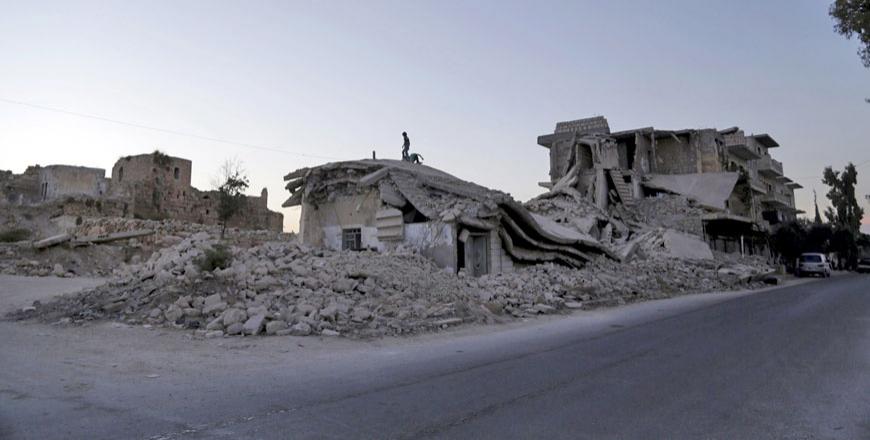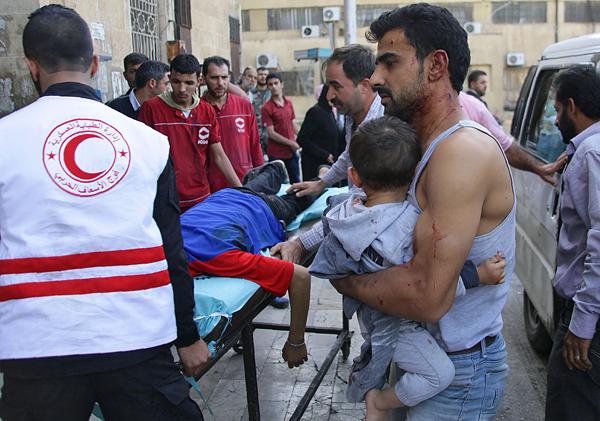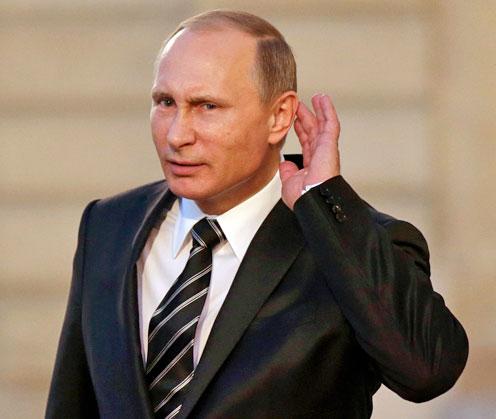You are here
Kremlin turns opinion over Syria with US-style ‘shock and awe’ media blitz
By Reuters - Oct 11,2015 - Last updated at Oct 11,2015

In this photo made from the footage taken from Russian Defence Ministry official website on Friday, a bomb is released from Russian Su-34 strike fighter in Syria (AP photo)
MOSCOW — Russian President Vladimir Putin and his circle have spent years criticising what they said was Washington's calamitous 2003 military intervention in Iraq and its pernicious habit of meddling in the Middle East.
But faced with marketing their own foray into the region for the first time since the Soviet invasion of Afghanistan — in Syria — the Kremlin is borrowing US government and broadcast tactics to replicate the media campaign that George W. Bush used to win American hearts and minds.
Be it in Chechnya, Georgia or Ukraine, the Russian military has traditionally been cagey about its campaigns. But in Syria, the Russian defence ministry has turned itself into a 24-hour news station, pumping out slick TV footage of cruise missile and air strikes complete with animated graphics.
With post 9/11 Afghanistan, Bush declared a war on terror. In Russia, Moscow's Syria intervention is being similarly sold. Only this time the enemy is Daesh militants who the Kremlin says could come to Russia once done with Syria.
Weathering a worsening economic downturn and weary of hearing about the travails of Kremlin-backed rebels in eastern Ukraine, many Russians appear to be enjoying the show and buying into the Kremlin's message that its intervention is evidence of the country's military and diplomatic renaissance.
The propaganda push, which has even extended to a TV weather presenter describing the climatic conditions for air strikes, seems, from a Kremlin viewpoint, to be working so far.
Less than two weeks ago, just 14 per cent of Russians said they backed direct military intervention in Syria. This week, a similar poll, by the same Levada pollster, showed that 72 per cent had a broadly positive opinion of Russian air strikes.
"There was a sharp change [in opinion]," said Stepan Goncharov, of the Levada Centre. "Before, the conflict was regarded as someone else's. But the media were able to present it in such a way that it came to be viewed as an essential intervention by Russia in the region."
As the first snow of the winter falls in Moscow, he said the Syria conflict was proving a helpful distraction for some Russians who did not want to spend their evenings thinking about rising prices, Western sanctions, and shrinking family budgets.
"Foreign policy is viewed as a spectacle here," said Goncharov. "People turn on the TV and what is important for them is a show. The attacks, the bombing, the shoot-ups are all elements of the show."
TV dominant
Despite the Internet, TV news remains paramount in Russia with an estimated 90 per cent of the population using it to follow current affairs. The three main Internet news aggregators also base their choice of stories on the TV news schedule, Goncharov said.
Since September 30, when Russia first launched its air campaign in Syria, TV viewers have been treated to movie-like images of Russian jets bombing targets, to palls of smoke rising in their wake, and to Russian warships based in the Caspian Sea firing cruise missiles across Iran and Iraq to hit Syria.
"That we carried this out from the Caspian Sea at a distance of around 1,500 kilometres, with high-precision weapons and hit all our targets, reflects of course the good preparation of our military," Putin told his defence minister, in images broadcast on the evening news on the same day as the Russian leader marked his 63rd birthday.
Under Putin, Russia has brought back the Soviet-era Red Square parades of military might and embarked upon an ambitious military modernisation programme. Images of Russian rockets and planes in action swell national pride and may even boost arms sales.
Peter Pomerantsev, author of "Nothing Is True and Everything Is Possible", a book which looks at Kremlin propaganda techniques, said the TV campaign sent another message too.
"The message here is 'Look if we can launch missiles at Syria we can definitely crush any protests so don't even think about it,'" he told Reuters.
Using social media, the defence ministry has been swift to distribute its videos and images. The tone of its commentary, in press releases and in briefings, has been triumphant.
James Rodgers, a senior journalism lecturer at London's City University, said the Russians had watched how the US government and media had presented Washington's Middle East wars and tried to follow suit.
"They are unquestionably trying to imitate it," Rodgers told Reuters, saying images of missiles being launched from the sea and cockpit videos were reminiscent of previous US campaigns.
"It is a definite attempt to say to the United States that Russia has got a policy where it believes Washington does not and what's more we are going to borrow and adapt your media techniques to show that to the world."
Samuel Greene, the director of the Russia Institute at London's King's College, said the Russians were also borrowing US rhetoric from the Iraq war to shore up the legitimacy of what they were doing.
"From the very beginning, this has been couched in language that is almost identical to the language that the United States used in justifying domestically its intervention in Iraq," said Greene.
Saviour of the world
Images of Russia projecting force so far beyond its borders while showcasing its military and technological prowess were, at least for now while everything seemed to be going to plan, giving Russians "a warm and fuzzy feeling", said Greene.
But if something went wrong, such as a Russian plane being downed, most analysts believe public opinion could sour.
Memories of the Soviet intervention in Afghanistan and the heavy price it exacted in blood and treasure remain strong and the same Levada poll which showed solid public support for air strikes also showed that almost half of those asked thought the Syria foray could turn into another Afghanistan.
Igor Yakovenko, a popular blogger and journalist who is critical of the Kremlin, points out important differences however between the US campaign in Iraq and Russia's intervention in Syria.
"In Iraq, the Americans toppled a dictator, " he told Reuters. "In Syria, Russia is supporting a dictator."
A regular commentator on how the media operates in Russia, Yakovenko said the Kremlin had successfully used Syria, like other episodes before it, to fuel its preferred domestic narrative of Putin as the leader of the modern world.
"The main message being pushed here is that the United States took fright and could not achieve anything despite bombing Syria for years, that it got down on its knees to ask Putin to help, and he did and destroyed the terrorists," he said.
"The main idea here is of Russia as saviour of the world. First we saved the world from the Mongols, then from Napoleon, then from Hitler, and now from Islamic State [Daesh]."
Related Articles
MOSCOW/WASHINGTON — Russia launched air strikes against targets in Syria on Wednesday in the Kremlin's biggest intervention in the Middle Ea
MOSCOW — While Western media are filled with grim images of life in areas of Aleppo under siege by Russian-backed Syrian government forces,
MOSCOW — Whatever effect Russia's air strikes are having on the ground in Syria, their impact at home is clear: They prove to Russians that



















